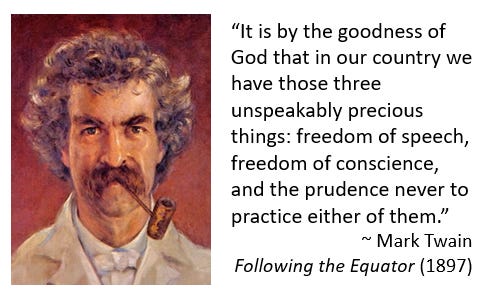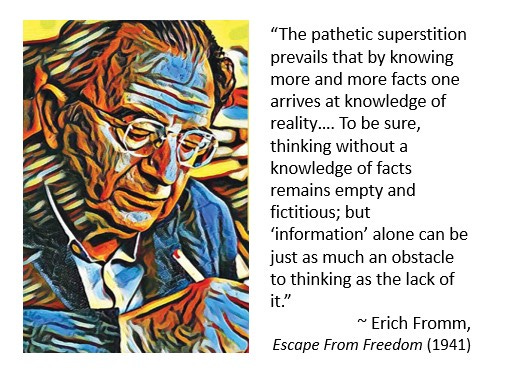Why Going with Our Gut is Not Enough: Critical Thinking and the Art of Mindfulness
Part II in a Series Exploring the Art of Critical Thinking in the Pursuit of Living Well
No human activity is more consequential in shaping our lives than thinking. The power of thought is captured in the opening lines of The Dhammapada, a collection of the wisdom attributed to the Siddhartha Gautama, the Buddha. In the text, written around the first century BCE, we read:
“We are what we think
All that we are arises with our thoughts.
With our thoughts we make the world.
Speak or act with an impure mind
And trouble will follow you
As the wheel follows the ox that draws the cart.”1
To think—to navigate, make sense of, or organize experiences and ideas—is essential to being human. We think all the time, yet, ironically, do very little thinking about our thinking.
Many of us fail to even recognize thinking as an activity or undertaking at all. We experience thinking like we do blinking, something that just “happens.” We’re more likely to identify how we feel than the thinking responsible for producing that feeling.
To think critically means, in the first place, to develop deepened awareness of the influence our thoughts exert over our lives. In a word, critical thinking begins with mindfulness about the thinking that gives meaning to our experiences and animates our lives.
The Insufficiency of Going with your Gut
We can enhance our appreciation for the importance of mindfulness as a core component of critical thinking by considering a strange and alienating experience familiar to most seasoned drivers. Such drivers have invariably had the experience of arriving to our destination only to wonder, “How the hell did I get here?” It was only moments ago, so it seems, that we sat in the driver’s seat, started the engine, and pulled out onto the roadway. Yet now we find ourselves pulling into the parking lot of our destination some 30 miles away from our starting point.
We were undoubtedly thinking as we shifted gears, signaled lane changes, turned the wheel to maneuver through dense traffic, and applied gas and then the brake. Yet our skill in driving, derived from countless hours of practice, enabled us to enter an effortless flow. This allowed us to divert our conscious thoughts to other matters: getting absorbed in good music or an audiobook, a conversation with a friend, or lost in a delightful daydream.
Watch my short video, “Thinking Critically is an Art,” at TikTok
The seasoned driver’s experience alerts us to the fact we are perfectly capable of thinking without being consciously self-aware of our thoughts. This isn’t always a bad thing, of course. There are times when the athlete, dancer, lover, or writer would be thwarted by excessive self-awareness. For example, I always urge my students not to worry about punctuation, spelling, and other formalities in the opening stages of writing; to allow their raw ideas to be pressed into the keyboard and onto the screen without arbitrary interruption. This part of our thinking—our seemingly automated or what is called “hot cognition”—is a necessary condition for living well. But it isn’t sufficient.
Though life sometimes demands quick, spontaneous action, we cannot always “go with our gut.” Flatland dwelling drivers would be unwise to “loose themselves” while navigating, for the first time, the daunting, curvaceous inclines of the Blue Ridge Mountains in North Carolina. Many a consternated native Carolinian has found themselves trapped behind a Floridian driving with incredulous opposition to the “speed limit” along a two-lane mountainous roadway.2 There simply is no “automated” thinking to rely upon when we haven’t developed the knowledge and muscle memory required of that unique terrain. Thus, we learn that life sometimes calls for adept deployment of a “colder,” more self-aware cognition.

We need mindfulness over gut-reaction to examine new, unfamiliar problems and, occasionally, to reassess the old ones we think are solved. In most cases, going with our “gut” means going with our training and experience. It makes sense to go with our gut when the situations we’re in require immediate, decisive action. But we’ve all been in plenty of other situations where our reactions were flawed, causing an existing problem to become worse. Sometimes going with our gut—letting our automated thinking take over—is a cop-out from doing the heavy lifting of carefully, reflectively thinking through a situation or belief.
It’s also important to note that these reflective experiences function to educate and therefore enhance the quality of future well-chosen “gut” responses. Those strictly relying on automated, reactive responses to the world miss out on crucial opportunities to train and enlighten their gut.
Interpretation of Everyday Life
Having established the difference between unthinking thought and self-aware thought, it becomes essential that we consider the role interpretation plays in not just our understanding of novels, movies, and poetry but also the most mundane aspects of life. Most of what we claim to know about the world is a result of an often-unrecognized interpretive process of inference, not of direct experience or simple observation. To infer or reason is to come to a conclusion about something—I’m going to like that movie—on the basis of something else we think to be true—I like movies with Steve Carell, and that movie stars Steve Carell.
Many of us will know the dictionary definition of the words “infer” and “reason.” But such definitions aren’t always as helpful as they seem. We have a tendency to confuse being able to use a word or give its customary definition with comprehending the significance of the idea behind the word. The art of thinking well—critical thinking—requires more than an understanding of a boiler plate definition of reasoning, it requires awareness of the way in which reasoning influences our experience of the world
Very few things in life can be understood without making an inference. And when we consider how often we draw conclusions each day, and how those inferences become the foundation of subsequent inferences, we begin to appreciate how important it is to be mindful of the thought processes—the mental choices we make, consciously or otherwise—that shape our actions and lives.
To think critically entails recognizing that we human beings do not simply experience the material world just as it “really” is. Our sensory experience is filtered through a collection of lenses or concepts that shape our understanding and, consequently, feelings about the facts and events of everyday life. Even seemingly concrete claims like “this is a dog” are the result of overlooked interpretive inferential processes. The conclusion that this four-legged, furry creature that is barking and wagging its tail is a dog is the result a a series of inferences—of our having filtered sights and sounds through predetermined ideas or concepts such as four, leg, furry, bark, wag, and even “dogness.”
The Illusion of “Unfiltered” Thought
Critical thinking challenges us to overcome the narrowminded, egocentrism that tends to direct our default mode of thinking. Many of us find it all too easy to experience our perception of and thinking about the world as unfiltered, assuming that we see the world as it actually is. And we are frustrated that all these other people, these “damn fools,” many of whom are members of our own family and household, can't see what anyone with “20/20 vision” should be able to see
The following scenario captures the problem at hand.
You’re telling a friend about a recent argument with a loved one, but your friend keeps checking her watch. You conclude that she clearly doesn’t care about your feelings or difficulties, so you cut the conversation off and abruptly leave.
We might like to imagine ourselves as utterly above such an impetuous reaction. But then again we are only human. And just because we have something—be it the power of reasoned, critical thought or a gym membership—doesn’t mean we make regular use of it. Our relationship to reasoned, critical thought is analogically captured in Mark Twain’s description of the relationship between Americans and two of their fundamental rights:
“It is by the goodness of God that in our country we have those three unspeakably precious things: freedom of speech, freedom of conscience, and the prudence never to practice either of them.”
One of the frustrating “marvels” of humanity is that we can suppress our greatest gifts precisely when we need them the most. Returning to our scenario:
Later, when your friend calls asking what happened, you indignantly respond, condemning her disrespectful behavior. “You are so insensitive! You're so disrespectful!” And the situation spirals downward from there as your friend angrily defends herself against what she perceives as an unprovoked attack.

Two fundamental and interrelated problems present themselves in this scenario. In the first place, our natural self-centeredness leads us to commit that most common and equally insidious of all fallacies, the self-evidence fallacy: presuming that a claim or conclusion is so irrefutable or obvious that it requires no defense or explanation. This fallacy is cut from the same cloth of egocentrism or self-centered thought whereby we presume that the beliefs that spring so forcefully and seemingly naturally to our mind must surely also spring to every other rational, honest mind.
No argument or defense is needed, the self-evidence fallacy encourages us to believe, beyond a brow beating repetition of the claim. Yet to defend a claim with the very conclusion in question is to compound the self-evidence fallacy with the fallacy of circular argument since conclusions are rarely equipped to justify themselves, unless they are those rare axiomatic pillars of truth that form the foundation of our worldview.
Critical Thinking and the Construction of Meaning
Arguing in circles and insisting our beliefs are self-evident prove little more than our failure to think critically. Yet this egoism is sometimes innocently sustained by the mistaken presumption we’re mere passive observers of reality, just chroniclers of the world’s unvarnished story. A more accurate picture of our situation is that we are engaged in an inherently creative cognitive activity of constructing meaning, however conscious or unconscious, through the inferences we make about our experience.
The facts of the world do not, by themselves, necessarily disclose or declare their “meaning” or “significance.” The meaning of our world is determined by not only the facts but also the interpretive beliefs—the lenses or concepts—that we filter them through. The fact our friend was checking the time could indicate she was disinterested in what we had to say. But that’s not the only way to interpret such a fact. It could also mean that she had some place to be and was worried about being late. The fact that our friend sat with us and listened to us, discreetly checking the time periodically, could even indicate care for us. She might have chosen, for example, to imprudently postpone leaving for an important meeting until the very last minute possible to give us the time needed to share our feelings with her.
The fact someone looks at the time tells us nothing, by itself. Only when such a fact is coupled with an interpretive belief, such as “if they check the time frequently, they don’t want care about what I have to say” or alternatively, “if they check the time frequently, they are worried they might be late to an important function,” does it gain meaning or significance. And yet these kinds of background beliefs go unrecognized as taken-for-granted facts.
Often what we claim are facts are actually value judgments. That is to say they’re statements about what is good or bad, appropriate or inappropriate, worth doing or worthless. For all of our understandable concerns about getting the facts straight, we too often fail to appreciate that facts are, by themselves, mostly meaningless. As pioneering social theorist Erich Fromm explained in his 1941 book, Escape from Freedom, the belief that accumulated information was the same as knowledge constituted a superstition.
“The pathetic superstition prevails that by knowing more and more facts one arrives at knowledge of reality…. To be sure thinking without a knowledge of facts remains empty and fictitious; but ‘information’ alone can be just as much an obstacle to thinking as the lack of it.”
The English philosopher John Stuart Mill made much the same point in On Liberty (1859) when he wrote, “very few facts are able to tell their own story, without comments to bring out their meaning.” Facts distilled from vital context, elaboration, and relation to value judgments generate misinformation and distort reality rather than clarify it.
To think critically we must do more than act upon our perceptions, we must begin to acquaint ourselves more fully with the beliefs that generate those perceptions. For as important as the facts are, we too often ignore the active influence of non-factual normative beliefs—values, in a word. More than insisting something is good or bad, right or wrong, we must ask what it is about the thing or event that inclines us to a particular judgment and whether or not that interpretive belief is justifiable. For our understanding of the world is only as enlightened as our foundational beliefs are illuminating. Yet we cannot even begin to truly contemplate the wisdom of such beliefs without first becoming mindful of the power thinking exerts over our lives and the importance of self-aware, creative, and critical thinking.
A Hilarious Insight on an Oddly Cold Florida Night
The unique difficulty we all face is that some of what we need to mindfully reflect upon feels self-evident, so obvious and directly experienced that it’s not clear what we would even be reflecting upon. A recent epiphany by one of my children helps make this point while also highlighting the importance of embracing intellectual humility and openness.
On a rare cold Florida night, with temperatures dipping into the 50s, we sat outside enjoying a warm fire. From our chairs, we saw our neighbor’s adorable and growing puppies on the other side of a wooden fence, watching us between the gaps with their tails gently wagging. That’s when my pre-teen son shared that it had just recently occurred to him that dogs could understand Spanish just as easily as they could understand English. Though our neighbors speak English, their first language is Spanish. So we often hear them playing with their dogs and talking to them in Spanish just as we talk to our slow to self-actualize Chocolate Labrador named Maslow.
Brought into the light of scrutiny, my son was the first to observe the foolishness of his unthinking presumption that dogs might favor one language—the one most familiar to him—over another. And therein lies the point: we’re all so easily inclined to take for granted our own basic beliefs and experiences for the simple reason that we can hardly recognize them as active and contestable beliefs in the first place.
Each of us takes for granted any number of questionable beliefs that are unique to ourselves or our ethnic group. To think critically requires heightened awareness of just how easy it is to be mistaken about even the most mundane matters. To think critically is to embrace an openness of mind, intellectual humility, and the curiosity and vigilance to check our egocentric inclinations. We can all get started by trying to recognize the interpretive leeway in our everyday inferences, and by reconsidering the assumptions we make about our loved ones and the linguistic preferences of canines.
If you enjoyed this post please share it with others and like it by clicking the heart icon. Be sure to subscribe if you haven’t already.
Invite Dr. Nall to Speak
Dr. Nall delivers energetic live presentations and engaging workshops on the subjects featured in Humanities in Revolt. Those interested in booking a workshop or talk can get in touch through Facebook or by leaving a comment.
Gil Fronsdal has alternatively translated the opening lines to read, “All experience is preceded by mind, Led by mind, Made by mind. Speak or act with a corrupted mind, And suffering follows As the wagon wheel follows the hoof of the ox.”
I’d like to take this opportunity to apologize for any North Carolina drivers I may have inconvenience learning to navigate your breathtaking terrain.







Really good article! Thank you.
In the past 50y, I find that our education systems* have increasingly moved away from teaching students how to think critically and toward learning lots of useful facts and processes. Hugely detrimental!
Obviously I'm as guilty as the next person of mdoing this (I'm sure!), but I was very lucky to do my undergrad at MIT in the 90s, where critical thinking, gathering evidence, seeking alternative explanations for things, etc., was just part of the environment. I didn't know that I was learning to think critically, but I did. It's probably the most important thing I got from MIT.
* in the 3 countries I've lived in: Canada, US, UK